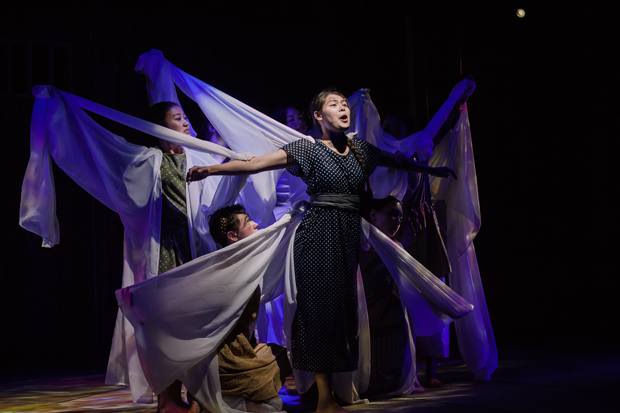Comfort Women: A New Musical Explores the Plight of Korean Sex Slaves
This World War II-set Dimo Kim Musical Theatre Factory production returns off-Broadway.

(© NK Kim)
If ever there was a show to demonstrate the chasm between good intentions and middling execution, Comfort Women: A New Musical is it. The subject — the history of the Imperial Japanese Army's sexual enslavement of Korean women before and during World War II — is certainly worth exploring, though it's hardly conventional musical material. But then, similar concerns about the viability of such a grim topic for such a typically buoyant genre didn't stop Jay Kuo, Marc Acito, and Lorenzo Thione from bringing the experience of Japanese-Americans in internment camps during the same world war to the Broadway stage with Allegiance back in 2015. So a full-scale musical about the plight of Korean women forced into prostitution — a subject probably less widely known to Americans — is not necessarily a bad idea.
If only the creators of Comfort Women — composer-lyricist Bryan Michaels, co-composer Taeho Park, and book writers Dimo Hyun Jun Kim, Osker David Aguirre, and Joanne Mieses — had the star power of Allegiance's George Takei, Lea Salonga, and Telly Leung backing them. Not that the cast of this revival — Comfort Women first premiered at Theatre at St. Clement's in 2015 — lacks talent. But the young cast's relative inexperience is at times glaringly obvious.

(© NK Kim)
Sure, one can suspend disbelief with some of the inadequacies. Early on in the show, Goeun (Abigail Choi Arader) — about to take up Mr. Komino (an appropriately oily Sam Hamashima) on his offer to sail to Indonesia for what she believes to be a high-paying factory job — divulges her decision to a woman who is meant to be her mother, even though the actor, Genevieve Shi, looks younger than her daughter. Less forgivable, however, is the lack of nuance in many of the performances, most notably in the way some of the actors belt the musical numbers as though they're more interested in hitting glory notes American Idol-style than in expressing their characters' emotions. This incarnation of Comfort Women, directed by Kim himself, feels more often than not like watching a competent college production than an ostensibly professional off-Broadway affair.
Strong execution wouldn't disguise the shortcomings of the musical itself, however. Michaels and Park adopt a strictly generic musical-theater idiom in their score, not even attempting the kind of synthesis of ethnic flavor and showbiz flair that David Yazbek brilliantly pulled off in his score for The Band's Visit. Worse, Michaels's lyrics are prosaic, clichéd, and embarrassingly earnest. One woman's lament "Wishing doesn't help if you wait too long / Wishing that your wish had come at the right time" gives you an indication of the level of wit Michaels manages.

(© NK Kim)
As for the melodramatic book, the thinness of the characterizations dulls our investment in these people's fates, especially once Minsik (Matheus Ting, radiating nobility and vulnerability), a Korean serving as a soldier for the Imperial Japanese Army, resolves to help Goeun and her fellow victims escape their Japanese captors. And Nani (a flamboyantly mincing Mathew Bautista), an Indonesian errand boy, exists only to offer a bit of second-rate comic relief from the otherwise unrelieved severity.
The presence of a character like Nani points to a more pressing issue with Comfort Women: the creators' attempts to render the plight of these unwitting female sex slaves in an upbeat musical-theater style are at fundamental odds with such dour subject matter. A pantomimed gang rape and synchronized rifle-spinning by Japanese soldiers (their movements choreographed by Natanal Hyun Kim) threaten to trivialize real-life tragedies of physical and sexual violence. And though there's no doubt the Japanese should be condemned for their sexual enslavement of women, by denying them any real-world complexity and turning them into one-dimensional villains, the show demonizes them for the sake of easily digestible entertainment.
If nothing else, Comfort Women demonstrates how tackling "necessary" subject matter is not enough to compensate for a lack of artistic inspiration and imagination. This banal and forgettable musical leaves you thinking less about the historical atrocities it dramatizes than about how much more illuminating a Wikipedia page on the subject would be.

(© NK Kim)








